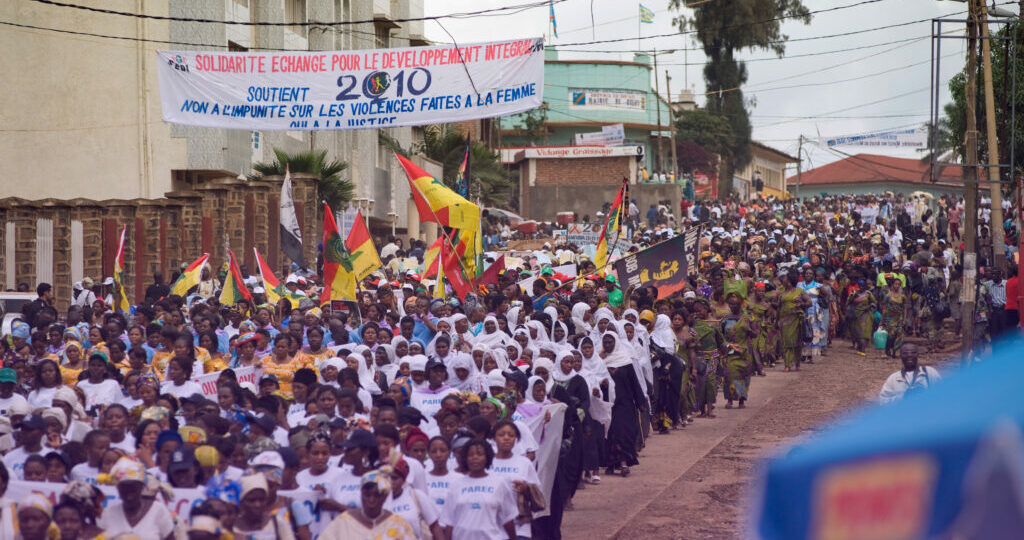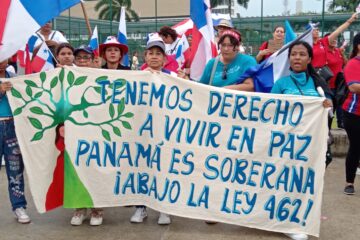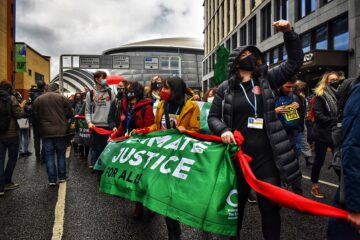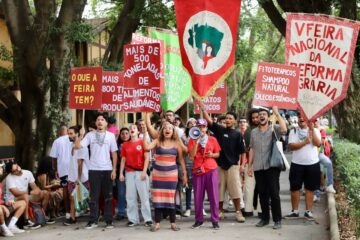In 2010, the World March of Women held its 3rd International Action, with the slogan “We will keep on marching until we are all free.” The action started on March 8th and looked back on the memory of socialist women as a celebration of the 100th anniversary of International Day of Women’s Struggles. Around 38,000 militants from 54 countries took part in feminist actions that year, working on the four action areas of the March: women’s work and economic autonomy; fighting violence against women; the common good and public services; peace and demilitarization.
The latter received special attention, especially due to knowledge accumulated by the movement from its previous International Action regarding war violence and borders. One of the goals of the 3rd Action was to draw attention to the violence experienced by women in territories ravaged by war and armed conflicts, presenting its causes. The actions showed that sexist violence is not simply a collateral damage of militarization, but a fundamental mechanism of capitalism, racism, and colonialism. In conflicts, rape is weaponized, and women are deemed spoils of war.
That year, the World March of Women reinforced its denunciation of the impacts of militarization in the peoples’ everyday lives, also presenting feminist alternatives for peace. So between March 8th and October 17th, 2010, women introduced joint agendas to fight patriarchal violence and militarization. The closing event of the Action took place in Bukavu, south region of the Democratic Republic of Congo (DRC). Approximately 1,000 women, mostly from the African Great Lakes region, took part in the activities over the week, and nearly 1,500 people joined the Great March for Peace on October 17th.

Sexual violence has become so widespread during the conflict in the DRC that violence against women has even been labeled one of the characteristic features of this war. Massive gang rapes of women and young girls have been reported in Sierra Leone, Rwanda, Liberia, the Balkans, Uganda and Sudan. But in the DRC, gang rape is used systematically and by all of the armed players, as a weapon of war.
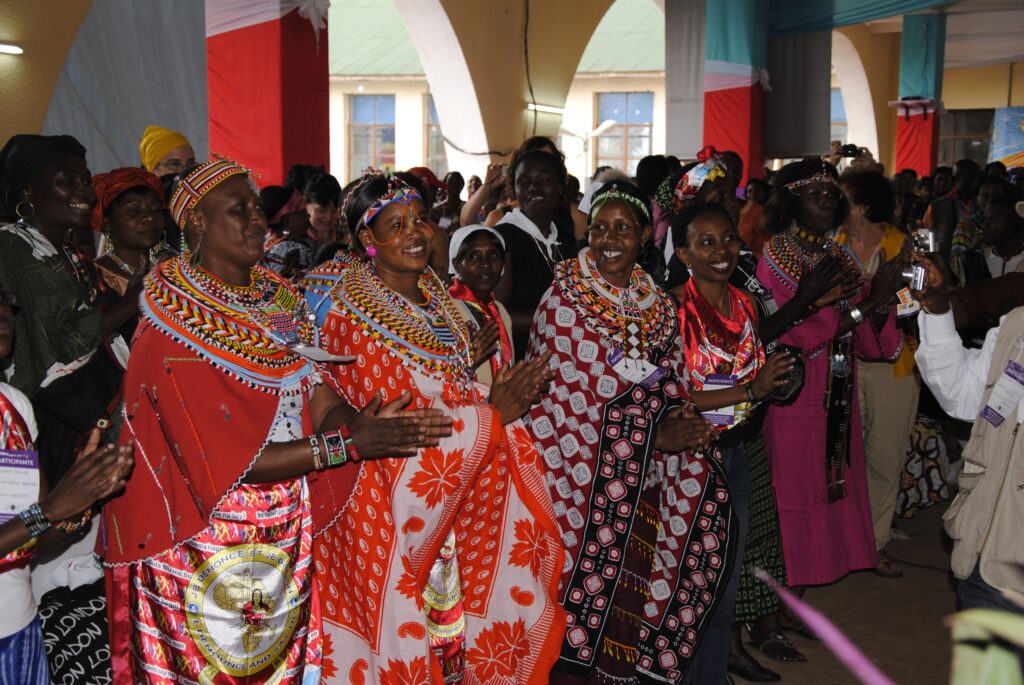
Bukavu, a Territory Struggling for Peace
The decision to close the 3rd International Action in the Democratic Republic of Congo was made during the 7th International Meeting of the WMW, held in Vigo, Galicia, in October 2008. The 148 delegates from 48 countries believed it was important to hold the closing activity in a country experiencing a conflict.
In Bukavu, which had been living under a conflict for more than 10 years, the rape of women and girls happened systematically, as a way to humiliate, dishonor, and demoralize each of the sides involved in the conflict. The armed conflict in the DRC involved economic interests: the battle to control the region’s abundant mineral resources and biodiversity and the profits of the arms industry and private security companies. These reasons were hidden behind the manipulation of ethnic tensions that allegedly explained existing conflicts in the territory.
Moreover, the United Nations Organization Stabilization Mission in the Democratic Republic of the Congo (MONUSCO) had been operating in the country for 10 years. At the time, the WMW was active in nine countries where the UN had Stabilization Missions: Haiti, Western Sahara, Ivory Coast, DRC, Sudan, Cyprus, India-Pakistan border, and Afghanistan.
In all of them, the movement questioned the presence of these UN military missions. This critique—which remains today—considers the imperialist character of these missions that operate in the name of peace, but don’t effectively promote it. Quite the contrary: they escalate violence. The presence of foreign military impacts local culture and economy, hurts the peoples’ sovereignty, and is wrapped in hypocrisy and impunity, as there are reports of violence against women perpetrated by soldiers who are part of these missions.
Women from Africa and the World in Action
Feminist solidarity has taken over the streets of Bukavu on October 17th during the Great March for Peace. Women demanded active, long-lasting peace and the end of militarization, criminalization, poverty, and violence against women. The mobilizations showed the power of organized women around the world and denounced the economic and geopolitical interests involved in armed conflicts. It was a moment to strengthen the mobilization and influence of DRC women, who also had proposals for their country that were deep-rooted in their everyday struggles. On the regional level, it was also crucial to further promote the joint efforts and cooperation between the WMW National Coordinating Boards in the Great Lakes region.
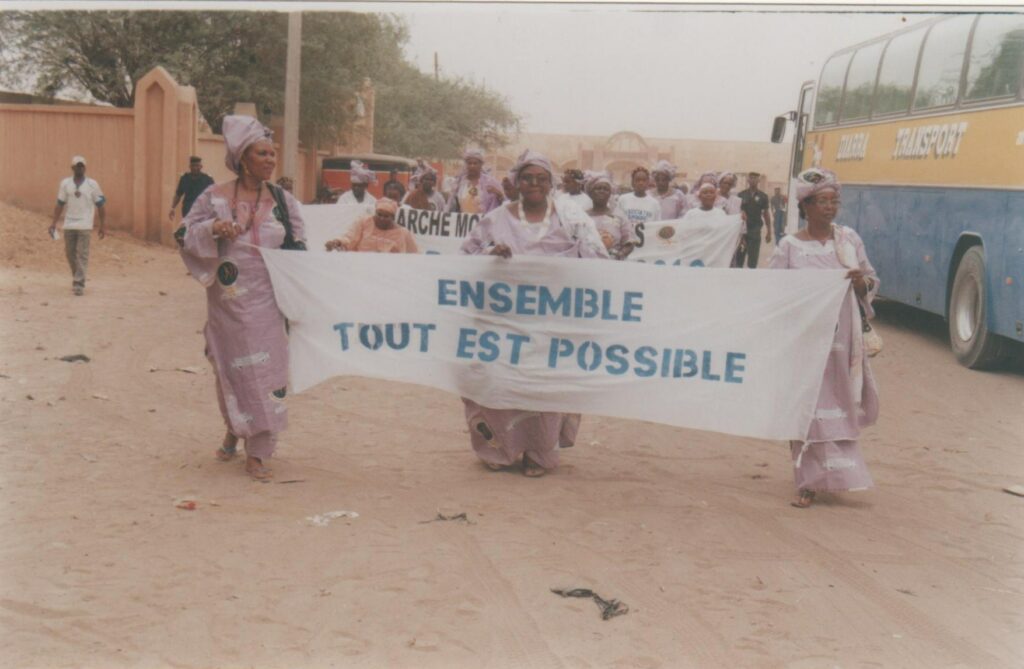
An action of such proportions was unprecedented in the DRC. It was possible due to groups of women who organized locally and nationally to struggle against violence and provide a number of services to women who were victims of the conflicts. An expression of international solidarity was organized with them.
The joint work these women do in the region neither started nor ended there. Ever since the 1st International Action of the WMW, carried out in the year 2000, five coalitions of women’s groups in Burundi, DRC, and Rwanda had been self-organizing and working together for peace in the Great Lakes region. After 2010, women from the Central African Republic, Uganda, and the then recently established WMW National Coordinating Board Kenya joined this group.
These mobilizations, reflections, and activities continue in WMW women’s everyday political life, both regionally and internationally. They demonstrate women’s role as a collective actor of feminism and social change in contexts of armed conflict. Women who resist different forms of war happening around the world today, especially in the global South, are not passive victims—they are active protagonists of their lives and resistance in their communities.
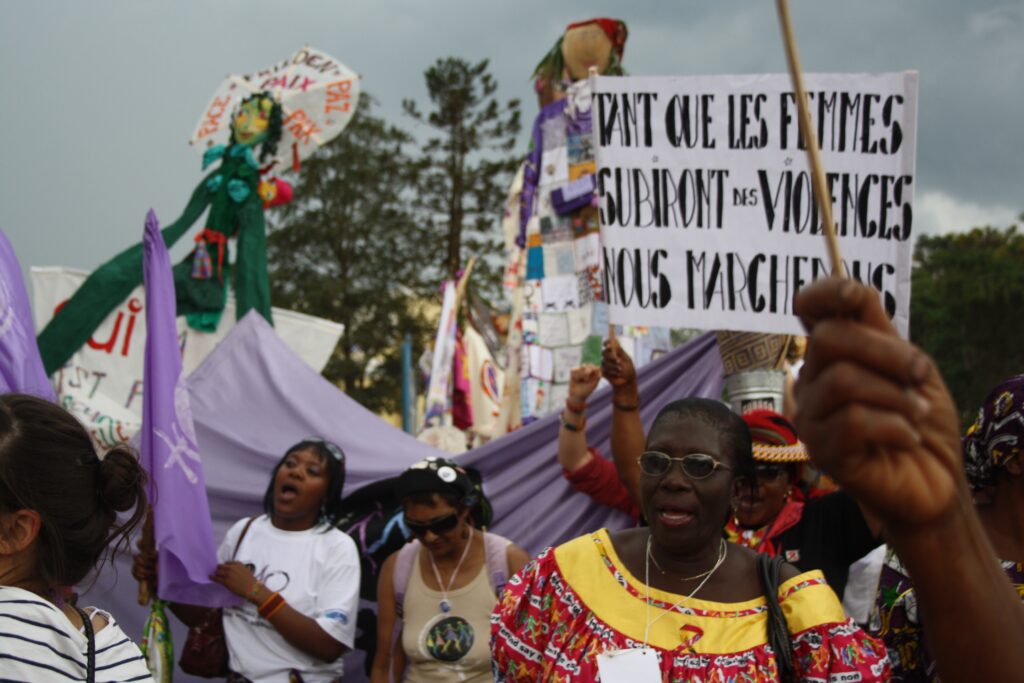
Peace and Demilitarization on the World March of Women Agenda
During the closing event of the 3rd International Action, the “Women’s Manifesto for Peace” was written by many hands, introducing the goals of organized women’s struggle:
“We have the responsibility to silence weapons by speaking out against the cunning arguments of those in power trying to paralyze us by using false speeches about safety, humanitarian missions and the war against terrorism, while meanwhile, the arms industry, the installation of military bases and the privatization and destruction of natural resources keep growing.
In the Women’s Global Charter for Humanity we declare that peace means much more than a lack of wars, it means ensuring the respect of our rights as inhabitants of this planet. With these goals and visions we keep marching, hands linked together with women and men, social movements and peoples of the world who are working to eliminate poverty and violence and to build a lasting peace.”
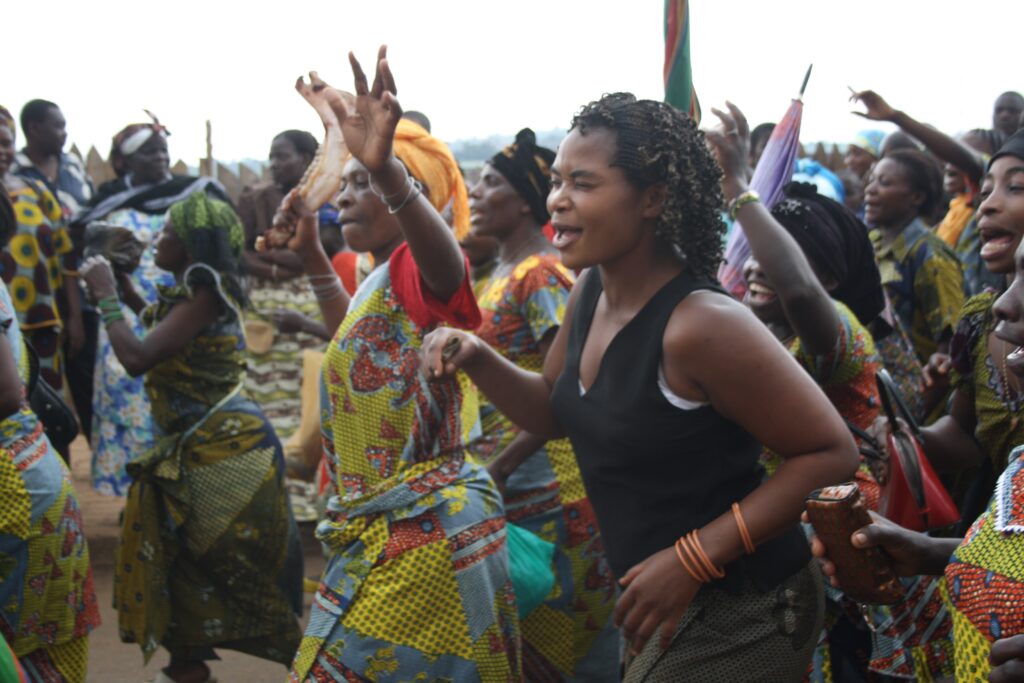
That year, women shared the struggle for peace and demilitarization from different parts of the world beyond Bukavu. Marches and caravans were organized in several countries. In Brazil, 3,000 women marched 100 kilometers over ten days. In Greece, demonstrations were held denouncing high military spending during the financial crisis that was devastating the country. In Pakistan, women took to the streets facing the offensive of religious fundamentalists who were repeatedly setting off bombs to terrorize the population. And in Mali, the accumulated political knowledge from the peace-building struggle in the country have ultimately led to a demonstration in Gao, a region struggling with an armed conflict.
In addition to these activities, regional actions were also organized in Asia, Europe, and the Americas. The action in the Philippines denounced US intervention, control, and military presence in Southeast Asia. In Colombia, the same US imperialist army played a key role in the continuity of the ongoing conflict in the country. A protest was held outside the Palanquero Military Base, one of many military bases where the US had operations aiming to gain geopolitical control of the region. In Europe, women from 23 countries gathered in Istanbul, Turkey, in a march to introduce their demands, under the slogan “Women, Peace, and Freedom.”
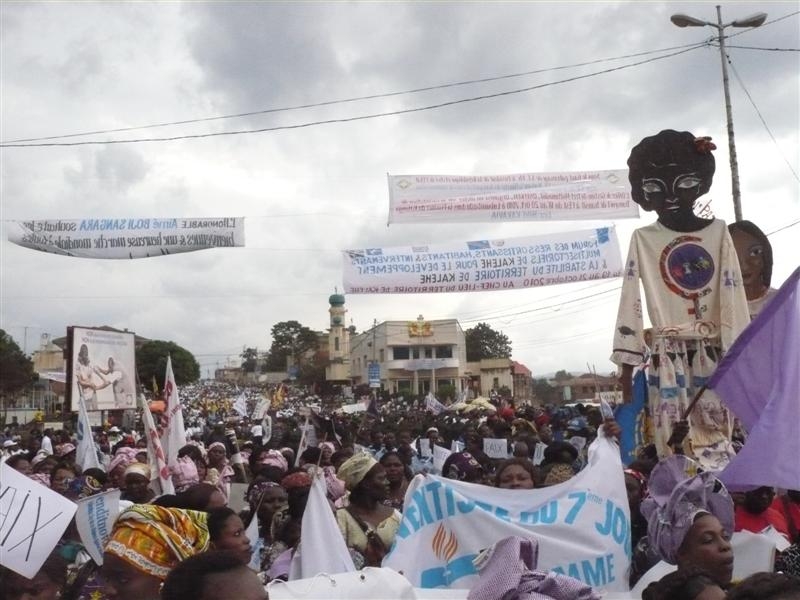
The accumulated political knowledge from the 3rd International Action of the World March of Women has consolidated the strength of the commitment to “keep marching until we are all free,” which means continuously building an internationalist grassroots feminist movement.
Militarization is a tool of imperialism that reinforces patriarchy and its imbrication with capitalism and racism. The militarization of territories and violence against women’s bodies have taken even larger proportions over the course of the years, with new offensives by US imperialism, the expansion of corporate power, and new forms of control over life and time by big tech companies, which are often connected to the military industry. Acknowledging the links between economic exploitation and racist and sexist violence is the fundamental basis to identify direct alternatives to them. This is why this has been a key topic on the World March of Women’s agenda since it first started to politically organize.

